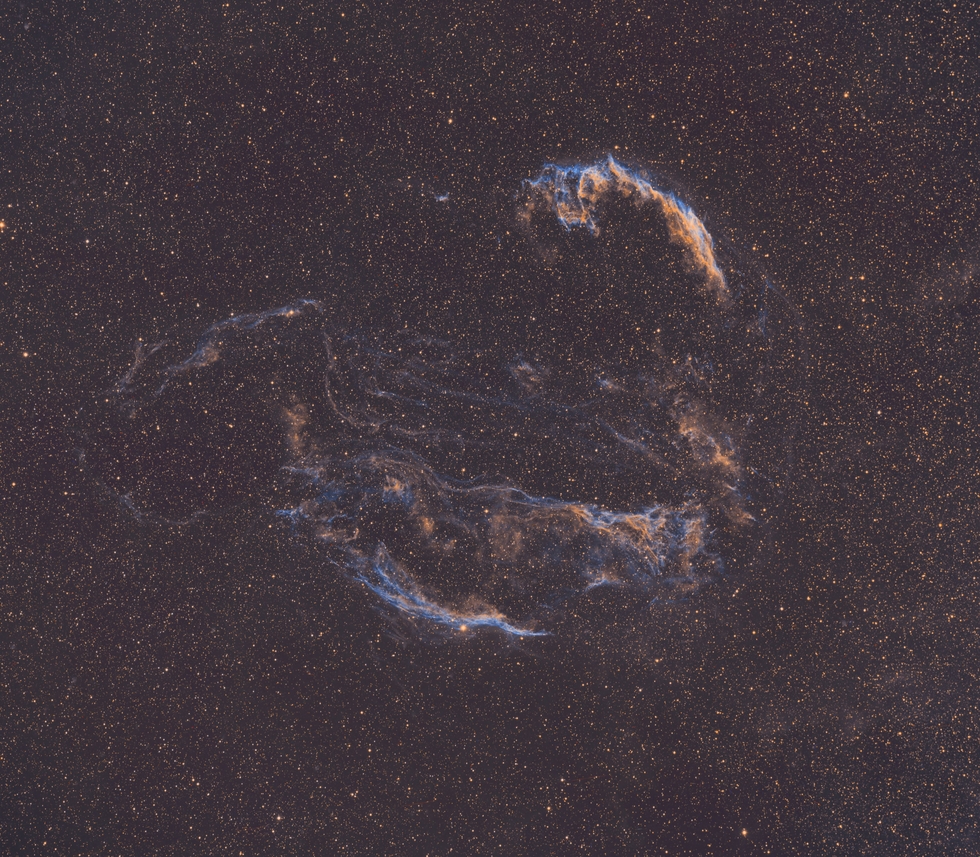East and West Veil Nebulae and Pickering's Triangle
East and West Veil Nebulae and Pickering's Triangle
The Swan Veil is a supernova remnant observed in the direction of the constellation Cygnus, about 5° south of the star Epsilon Cygni. It is a vast nebular complex with an apparent diameter of 6 times that of the full Moon, about 2600 light years away, and is what remains of a very massive star that exploded as a supernova between 5000 and 8000 years ago; Currently, its gases are expanding at a rate of about 170 km/s.
Due to the enormous width of the Swan Veil, its different parts have been assigned different numbers in the NGC catalogue: NGC 6960, NGC 6992, NGC 6979, NGC 6974.
The Veil complex was discovered by William Herschel in 1784 with the 18-inch reflector.
NGC 6960 is the western part of the Veil, and was described by Herschel as follows:
"Extended; go through 52 Cygni... about 2 degrees in length" then "Branching nebulosity... the next part divides into a few currents still gathered to the south."
This part is the easiest to observe, because you just have to take the magnitude 5 star 52 Cygni as a reference (still visible to the naked eye), point the telescope at it and observe in its immediate vicinity using an eyepiece that provides about 35 magnifications. NGC 6960 is already noticeable in a 20 cm Newtonian telescope, but with an OIII filter it is much more contrasty than the background sky.
Due to the enormous width of the Swan Veil, its different parts have been assigned different numbers in the NGC catalogue: NGC 6960, NGC 6992, NGC 6979, NGC 6974.
The Veil complex was discovered by William Herschel in 1784 with the 18-inch reflector.
NGC 6960 is the western part of the Veil, and was described by Herschel as follows:
"Extended; go through 52 Cygni... about 2 degrees in length" then "Branching nebulosity... the next part divides into a few currents still gathered to the south."
This part is the easiest to observe, because you just have to take the magnitude 5 star 52 Cygni as a reference (still visible to the naked eye), point the telescope at it and observe in its immediate vicinity using an eyepiece that provides about 35 magnifications. NGC 6960 is already noticeable in a 20 cm Newtonian telescope, but with an OIII filter it is much more contrasty than the background sky.
SPECIFICATIONS
Telescope
SPA-1-CCD
Camera
FLI PL16083
Location
IC ASTRONOMY OBSERVATORY, SPAIN
Date of observation
08-11-2022
Filters
SHO
Processing
Pixinsight
Credits
Processing: Sauro Gaudenzi / DATA: Telescope Live


